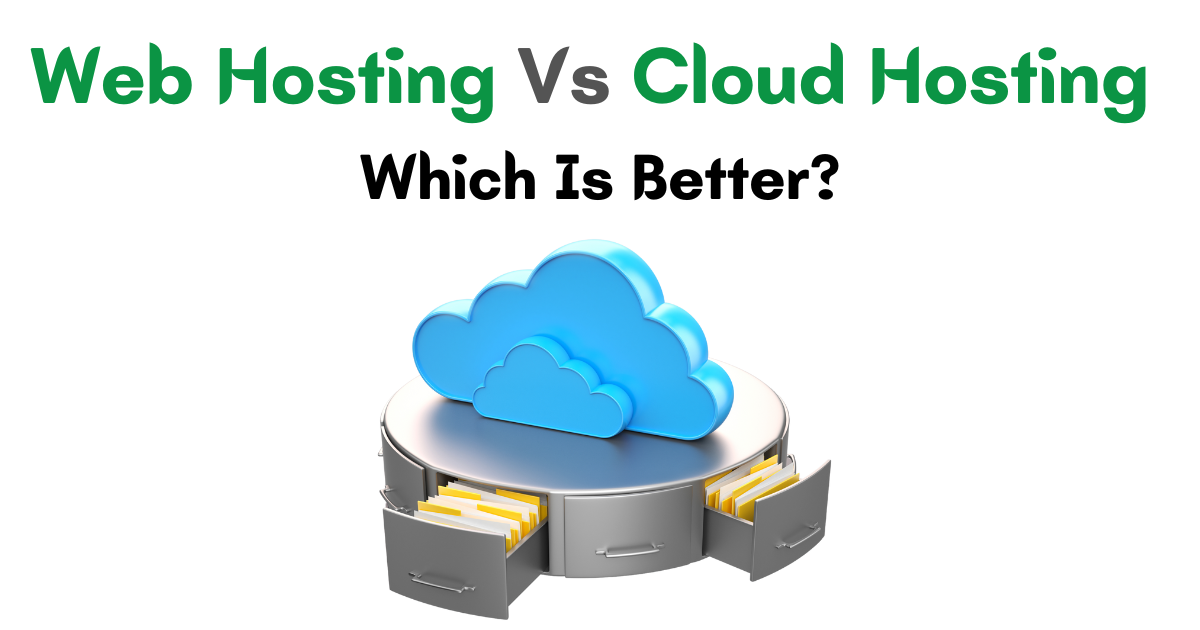Web Hosting Vs Cloud Hosting: Which Is Better

When it comes to hosting your website, you often have to choose between web hosting and cloud hosting. Understanding the differences and benefits of each option can greatly impact the success of your online presence.
In this article below, we will explore the advantages of both web hosting and cloud hosting and provide an assessment to help you make an informed decision.
Whether you prioritize control, scalability, or cost-effectiveness, we will guide you in choosing the right hosting option for your individual needs and goals.
So, let’s dive in and discover which is better: web hosting or cloud hosting? After the detail discussion at the end you will find which one is better for you.

What is Web Hosting?
Web hosting involves storing your website’s files on a server, making it accessible to users on the internet. It can be categorized into two main types: shared hosting and dedicated hosting.
In shared hosting, multiple websites share the same server resources. This means that your website will be hosted alongside other websites on the same server.
While shared hosting may provide cost savings, it also means that your site’s performance may be affected by the activities of other sites on the server. Additionally, you have limited control over the server settings and configurations.
On the other side, dedicated hosting gives you full control over the server. It means that the entire server is dedicated to your website, ensuring optimal performance and security.
With dedicated hosting, you have the flexibility to customize the server settings and configurations to meet your specific needs. However, dedicated hosting tends to be more expensive than shared hosting.
Additional Services
In addition to hosting your website, web hosting providers often offer additional services to enhance your website’s functionality and security.
These services may include automatic backups, SSL certificates for secure data transmission, and free domain registration.
By taking advantage of these additional services, you can ensure the smooth operation of your website and provide a secure browsing experience for your users.
| Web Hosting Types | Shared Hosting | Dedicated Hosting |
|---|---|---|
| Performance | May be affected by other websites on the same server | Optimal performance, as the entire server is dedicated to your website |
| Control | Limited control over server settings and configurations | Full control to customize server settings and configurations |
| Additional Services | Available, such as automatic backups and free domain registration | No additional services, as the focus is solely on dedicated hosting |
Web hosting allows you to store your website’s files on a server to make it accessible to users on the internet. It can be categorized into shared hosting and dedicated hosting, each with its own advantages and considerations.
Shared hosting provides cost savings but may have limitations in performance and control. Dedicated hosting, on the other hand, offers full control and optimal performance but comes at a higher cost.
By understanding the different types of web hosting and considering your specific needs and goals, you can choose the hosting option that best suits your requirements.
Web hosting Advantages
Web hosting is key for anyone wanting a website. It provides a space online for your site, essential for visibility on the internet.
A major perk is the technical support offered, making it easy to resolve site issues, keeping it live and functional.
Security is another benefit; hosting services include features to protect your site’s data from loss or theft and keep it safe from online threats.
Also, hosting ensures your website handles visitor traffic efficiently, preventing crashes and slowdowns, ensuring every visitor enjoys a smooth, hassle-free experience.
What is Cloud Hosting?
Cloud hosting takes website hosting to the next level by utilizing virtual storage space and multiple virtualized servers to provide a more dynamic and secure hosting environment.
With cloud hosting, your website is stored in a virtual space rather than on a single physical server. This allows for greater scalability, as resources can be easily allocated or scaled up or down as needed, without the need for server restarts.
The flexibility of cloud hosting is another standout feature. Unlike web hosting, which offers limited space and control, cloud hosting gives you the ability to easily adapt and grow your website.
As your business expands, you can effortlessly scale your resources to accommodate increased traffic without any disruptions to your website’s performance.
When it comes to security, cloud hosting provides enhanced protection for your website. By distributing resources across multiple virtualized servers, you have built-in redundancy and failover measures.
This means that even if one server fails, your website will continue to run smoothly without interruption. Additionally, cloud hosting offers improved reliability, as your website is not dependent on a single physical server that may experience issues or downtime.
Resource allocation is another key advantage of cloud hosting. With this hosting option, resources such as CPU, RAM, and storage space are allocated on-demand, based on your website’s needs.
This ensures optimal performance and prevents any performance bottlenecks, even during periods of high traffic.
Furthermore, many cloud hosting providers offer a pay-as-you-go pricing model, allowing you to only pay for the resources you actually use, making it a cost-effective option for businesses of all sizes.
Cloud Hosting Advantages:
- Virtual storage space
- Scalability and flexibility
- Enhanced security and reliability
- Efficient resource allocation
In summary, cloud hosting offers numerous advantages over traditional web hosting. Its virtual storage space, scalability, flexibility, enhanced security, and efficient resource allocation make it an ideal choice for businesses looking for a dynamic and secure hosting environment.
Consider your individual needs and goals when choosing between web hosting and cloud hosting, ensuring that the hosting option you select aligns with the specific requirements of your website.
| Advantages of Cloud Hosting | Details |
|---|---|
| Virtual storage space | Provides a virtual storage space for your website |
| Scalability and flexibility | Allows easy scaling of resources based on website needs |
| Enhanced security and reliability | Distributes resources across multiple virtualized servers for improved security and reliability |
| Efficient resource allocation | Allocates resources on-demand for optimal performance |
Web Hosting Vs Cloud Hosting: Which One Should You Choose?
Ultimately, the decision between web hosting and cloud hosting depends on your individual needs, budget, and goals for your website.
By considering factors such as scalability, control, and cost, you can make an informed choice that aligns with your requirements.
Web hosting may be a suitable option if you have a small to medium-sized website and prefer a fixed cost structure.
With web hosting, your site files are stored on a server, either in a shared hosting environment where multiple websites share resources, or in a dedicated hosting environment where your website has its own server.
While web hosting provides limited space and control, it often includes additional services like automatic backups and free domain registration to enhance your hosting experience.
If you anticipate growth, require flexibility, and prioritize security, cloud hosting may be the better choice for you.
Cloud hosting utilizes virtual space and relies on multiple virtualized servers to distribute resources effectively. This allows for easy scaling without the need to restart servers, making it ideal for websites with fluctuating traffic.
Additionally, cloud hosting offers better performance, reliability, and resource allocation, ensuring optimal website functioning even during peak periods.
When it comes to cost, web hosting typically follows a fixed pricing model, where you pay a set amount for a specific hosting package.
Cloud hosting, however, offers a pay-as-you-go pricing model, allowing you to only pay for the resources you use.
This can be advantageous if you have a limited budget or if your website experiences varying levels of traffic throughout the year.
In summary, assessing your individual needs, goals, and budget is essential in determining whether web hosting or cloud hosting is the better fit for your website.
Consider the scalability, control, and cost factors of each option to make an informed decision that meets your requirements.
Whether you choose web hosting for its simplicity or cloud hosting for its scalability, the right hosting choice will contribute to the success of your online presence.
FAQ about Web Hosting Vs Cloud Hosting
What is the difference between web hosting and cloud hosting?
Web hosting involves storing site files on a server, while cloud hosting represents storage located in virtual space. Web hosting can be shared or dedicated, whereas cloud hosting uses multiple virtualized servers to distribute resources.
What are the advantages of web hosting?
Web hosting provides additional services like automatic backups and free domain registration. It offers limited space and control but is more cost-effective compared to cloud hosting.
What are the advantages of cloud hosting?
Cloud hosting offers more scalability, flexibility, and security. It allows for easy scaling without server restart and provides better performance, reliability, and resource allocation compared to web hosting.
How much does web hosting cost?
The cost of web hosting is fixed and varies depending on the hosting provider and the package you choose.
How is cloud hosting priced?
Cloud hosting typically follows a pay-as-you-go pricing model, where you only pay for the resources you use. This allows for more flexibility and cost control.
How do I choose between web hosting and cloud hosting?
The choice between web hosting and cloud hosting depends on your individual needs and goals. Consider factors such as cost, scalability, control, and overall performance to make an informed decision.

